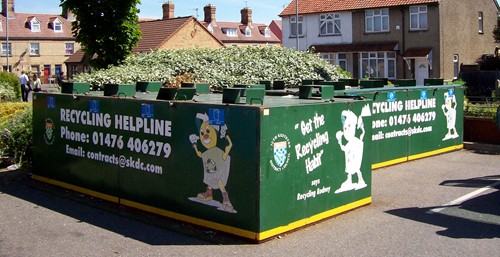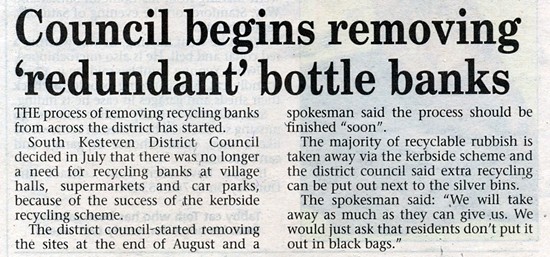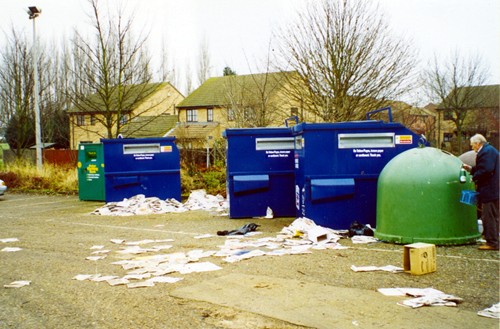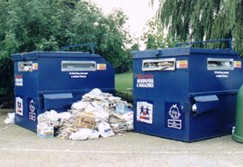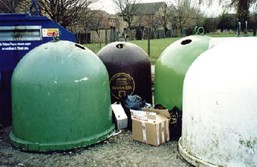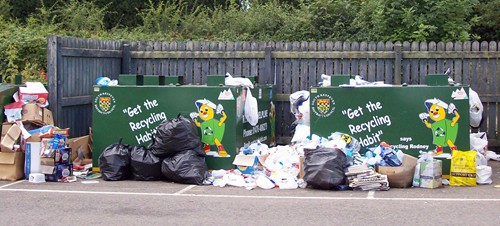|
Waste recycling banks
One of the most useful public amenities to be introduced by local authorities during the late 20th century were the waste recycling banks which were sited at vantage points in urban and rural areas to enable householders dump rubbish that had a recycling value. This included mainly paper such as newspapers and magazines, bottles, jars and other small glass objects, metal cans, plastic, clothing, shoes, and later more specialised items such as computer printer cartridges, books, CDs and DVDs. The system gave rise to the term "bottle bank" and in some areas "bring banks" and the various sites were widely advertised but the original metal containers were bulky and clumsy and by 2002 a sleeker and more user friendly design had been introduced and they were well frequented by the public and often filled to overflowing with the result that on some occasions when the council fell behind with its emptying schedule they created an unsightly mess. There were also cases of misuse where other larger unwanted household items were abandoned at the site such as sofas, beds and even television sets and kitchen appliances. But these cases were rare and overall, the banks were well treated and provided a welcome addition to the public refuse collection service. Bourne is part of the area administered by South Kesteven District Council which provides 43 such sites in Grantham, Bourne, Stamford, the Deepings and several villages. A contractor is employed to empty the banks regularly and ensure the site is left clean and tidy, with litter and spillages cleared. The containers are clearly labelled so users can see which collect what waste which are then taken to a Material Recycling Facility (MRF) where they are processed and delivered to various companies who will either reuse or recycle them.
There are several of these green-painted metal containers around Bourne, notably in the supermarket car parks at Sainsburys and Rainbow and on the spare plot of land behind Wake House, and they always seem to be in use and regularly filling up, but by June 2009 it became obvious that their days were numbered. There was no official announcement to this effect from South Kesteven District Council but by then, local authorities faced rising bills for staff salaries and pensions and were closely monitoring their costs and these banks were singled out for an ominous public consultation exercise which is usually the window dressing to hide the fact that an unpopular decision has already been made at Grantham. The reason given by the council was that recyclable waste was now being collected through the kerbside wheelie bin service which was introduced in the autumn of 2006. This provided each household with a silver bin to be used for such items as paper, glass and plastic, to be collected fortnightly. The writing had been on the wall for some time after the recycling banks
outside the Tesco supermarket in Market Deeping, near Bourne, were closed
in December 2007 on the pretext that an assortment of unwanted items had
been left there in breach of the regulations and it was forecast then that
this was the beginning of the end and on Friday 29th May, the Stamford
Mercury reported that a review was now being carried out. Tracy
Blackwell, head of healthy environment at SKDC, told the newspaper that since the
kerbside wheelie bin scheme had been introduced, more than 25,000 tonnes
of waste has been redirected from landfill to recycling and composting and
she added: “This has had a dramatic affect on the amount of waste
collected from our recycling banks which are based at village halls, car
parks, schools and retail outlets and we think this is the right time to
ask residents if this service still offers value for money, considering it
costs between £60,000 and £70,000 a year to provide.” The evidence in this case is that the facility is a useful one and that recycling banks are a positive addition to the waste collecting process especially as many large families find the silver bin totally inadequate for the amount generated during the two weeks between collections. Phasing them out therefore, constituted yet another cut back in our well used public services, a policy now being pursued by many local authorities that has already cost us our weekly kerbside collections which were axed for the first time in more than 100 years when the wheelies were introduced in 2006.
REVISED MAY 2011 Return to Rubbish
Go to: Main Index Villages Index |
||||||||||||
